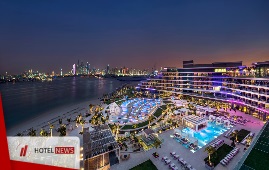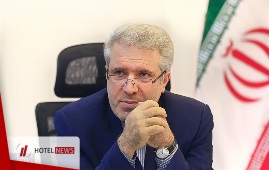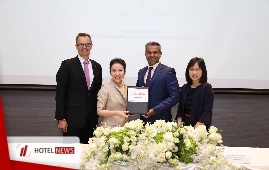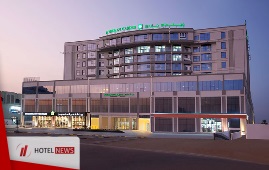
TEHRAN – Finally the wait is over for many tourism lovers in Iran as the country has introduced “Simurgh” - a huge mythical bird of Persian legend credited with possessing great wisdom – as its national brand for tourism. The national brand was unveiled by tourism minister Ali-Asghar Mounesan on Wednesday during the opening ceremony of the 13th Tehran International Tourism Exhibition, CHTN reported. Iran was ranked the third fastest-growing tourism destination in the globe in 2019, with 27.9 percent growth year on year, according to the latest statistics released by the United Nations World Tourism Organization (UNWTO). The Islamic Republic expects to reap a bonanza from its numerous tourist spots, including 22 ones that have been placed on the UNESCO World Heritage list. Under the 2025 Tourism Vision Plan, the country aims to increase the number of tourist arrivals from 4.8 million in 2014 to 20 million in 2025.
Create: Feb 19, 2020 Edit: Feb 19, 2020 Regional News
MGM Resorts International, MGM Growth Properties (MGP), and Blackstone Real Estate Income Trust (BREIT) announced the closing of the previously announced transaction for a joint venture formed between MGP and BREIT to acquire the Las Vegas real estate assets of the MGM Grand and Mandalay Bay for $4.6 billion. In addition, BREIT has purchased approximately 4.9 million MGP Class A shares at a price of $30.67 per share. In connection with the completion of the transaction, MGM Resorts has entered into a long-term, triple-net master lease for both properties. MGM has also provided a full corporate guarantee of rent payments. Together, the MGM Grand and Mandalay Bay comprise 9,743 rooms, approximately three million square feet of meeting space, and approximately 300,000 square feet of casino space across 226 acres on the Las Vegas Strip.
Create: Feb 19, 2020 Edit: Feb 19, 2020 International News
In January, The Inn at Elon in Elon, N.C., opened its doors to host its first guests. Managed by Charlestowne Hotels, the $31 million, 80-room hotel is the first on Elon University’s campus. The Inn at Elon, LLC, and all of its revenue beyond operating costs will be directed to fund scholarships for the university’s students. The inn’s conference facilities, which include a 5,200-square-foot ballroom that accommodates up to 340 people and outdoor lawn space for 440 people, are open to the public and available for business meetings and retreats as well as local celebrations and events. Additionally, the hotel has 10 suites and 70 rooms with king- and queen-sized beds; an upscale restaurant and lounge; a fitness center; dedicated on-site parking; valet and bell service; and complimentary bicycle rentals for guests to explore the campus.
Create: Feb 19, 2020 Edit: Feb 19, 2020 International News
Marriott International announced it signed a record number of rooms in 2019, pushing its global pipeline to approximately 515,000 rooms as of year-end 2019 for the first time in the company’s history. The company signed 815 agreements, representing more than 136,000 rooms, marking the seventh consecutive year of record-breaking volume of organic rooms signings. Growth was fueled by unprecedented levels of organic rooms signed in each of the company’s international regions. During 2019, the company added 516 properties with more than 78,000 rooms in 60 countries and territories – an average of one new property every 17 hours. “With growth and loyalty as the cornerstones of our company’s success, our unrivaled 2019 signings illustrate our winning strategy, which combines leading brands, powerful business platforms and an enduring focus on our associates,” said Tony Capuano, Group President, Global Development, Design and Operations Services, Marriott International. “We continue to drive value for our owners with quality branding options for both property conversions and new builds, backed by our leading business support systems and loyalty platform. By staying true to our growth philosophy and continuously responding to the evolving preferences and lifestyles of travelers, we are poised for a successful 2020 and beyond.” At the end of 2019, Marriott International’s worldwide system consisted of more than 7,300 properties and roughly 1.38 million rooms in 134 countries and territories. More than half of the company’s record global development pipeline is located outside North America. “With 141 million Marriott Bonvoy members who increasingly crave travel to new cities and unique experiences around the world, a record-breaking year of deals means new, exciting properties are coming for travelers worldwide,” said Stephanie Linnartz, Group President, Consumer Operations, Technology & Emerging Businesses, Marriott International. “Our stellar growth results prove that our broad brand portfolio and platforms are resonating with owners and developers, as well as with customers.” Record-setting year for growth in valuable international markets In 2019, 53 percent of the company’s signed rooms were outside North America with record-breaking organic volumes in the company’s Asia Pacific (38,000 rooms), Europe (17,000 rooms), Caribbean and Latin America (more than 9,000 rooms), and Middle East and Africa (8,000 rooms) regions. Additionally, in 2019, Marriott International debuted its first hotels in four additional countries – Cyprus, Moldova, Kyrgyzstan and Latvia. Company extends its lead in luxury Marriott International did a record-breaking number of deals for its global luxury hotel brands, bolstering its lead in this high-value segment. In 2019, the company signed 42 luxury projects in 27 countries and territories, while opening or converting 34 properties such as The St. Regis Venice, W Dubai – The Palm, The West Hollywood EDITION and The Ritz-Carlton, Pune. As the company focuses on expanding its leading luxury footprint, it is revitalizing W Hotels. Last year, the company purchased the W New York – Union Square, with plans to transform the property into a showcase for the brand’s future look. Successful all-inclusive launch Last August, Marriott launched its all-inclusive platform to bring its brands, scale and trusted service to this growing, global vacation segment. Less than six months after its launch, the company has signed seven management and franchise agreements for all-inclusive properties representing nearly 3,200 rooms. Among the all-inclusive projects in development are an 800-room Marriott Hotels resort in Jamaica and a 240-room Ritz-Carlton resort in Mexico. The company last year also completed its acquisition of Elegant Hotels Group, which consists of seven hotels and 588 rooms located on the picturesque island of Barbados. Affordable lifestyle hotel brands buoy company growth Catering to the next generation of travelers, the company’s AC by Marriott, Aloft and Moxy brands opened nearly 10,000 rooms in 2019. Combined, these brands represent more than 65,000 open rooms in 44 countries and territories, including new hotels in Greece, Ireland, Jamaica, Latvia, Nepal and Switzerland. The company signed nearly 24,000 rooms across the AC by Marriott, Moxy and Aloft brands during the year – with record room signings for both AC by Marriott and Moxy.
Create: Feb 9, 2020 Edit: Feb 9, 2020 International News
On February 15th, 2003, the first group of 67 Chinese officially travelling for leisure arrived in Germany, based on the ADS Approved Destination System agreement China and Germany signed the year before, second in Europe only to the island state of Malta, while for the rest of the Schengen Area the ADS agreement came only into force in September 2004. Your humble editor had stopped a few years earlier to be an inbound tour operator for Chinese delegations and had just finished the first semester as a tenured university professor. Witnessing the high expectations of my former colleagues, all buying coaches, employing additional staff and moving into bigger offices, I wondered if I had taken the wrong decision to opt out of the business just before the biggest bonanza ever for the German China inbound tour operators, looking forward to enjoying a year without competition in Europe. Unknown at the time, in November 2002 SARS (severe acute respiratory syndrome) started in Guangzhou and spread to many countries in the world. On March 15th, 2003, the WHO issued a global alert about a new infectious disease, advising against any unnecessary travel to and from East Asia. On April 2nd, Chinese officials finally began reporting the severity and extent of the SARS outbreak. As a result the second quarter of 2003 saw almost no Mainland Chinese citizen arriving in Germany, pushing several inbound tour operators close to bankruptcy. For the whole year, the number of arrivals however reached the level of 2002, and 2004 saw an increase of almost 40%, as many of the trips to Germany influenced by the SARS crisis were only postponed, not cancelled. Globally the same happened: From 16.6 million in 2002 the number of outbound trips jumped to 20.9 million in 2004 despite the three-month hiatus. With the yet not fully named 2019-nCoV, things could turn out in a similar way, based on what is known until now. On the one hand the disease is spreading much faster, given the much improved domestic and international transport infrastructure available in comparison to 2003, on the other hand the Chinese government reacts in a much different way to the crisis. Among many others, starting from the 27th of January, all group travel from China has to cease. Individual travellers however will have a bigger incentive than before to go abroad. The biggest difference is clearly the fact that in 2003 outbound tourism was the least concern except for those few directly involved during the SARS crisis. In 2020 there are already articles published discussing the fate of the tourism industry of Thailand, Japan and other countries if the main source market China implodes. Via an open letter of the CATS China Association of Travel Services published on the 26th, the international partners have been asked to “introduce relative refund and changes policies to minimize Chinese tourists financial loss”. How much this will remain a wish or will become a demand, is one of the many unknown factors in the 2019-nCoV development. The main concern remains of course to minimize the loss of life in China. In all previous cases, being it SARS, MERS or the Lehman Brothers global economical crisis, demand bounced back stronger than before after two or three months. So it will be a good idea to use the time of the slowdown to train everybody involved in servicing Chinese customers, using the brand new CTT China Tourism Training. Let’s hope that the Year of the Rat will have a better ending than this dire beginning and that all our readers, their colleagues, family and customers will stay healthy.
Create: Jan 31, 2020 Edit: Jan 31, 2020 International News
Iran’s tourism minister on Saturday issued a statement, inviting all travelers and holidaymakers to visit the ancient land, saying that the country-size guesthouse is wholeheartedly ready to receive tourists from around the world. Ali-Asghar Mounesan emphasized that the Iranian government is trying its best to host incoming tourists by improving tourism infrastructure, offering attractive and pocket-friendly packages, as well as incentives such as visa waivers or 90-day visas on arrival. Mounesan’s statement comes weeks after the country’s tourism suffered losses in the wake of recent tensions in the region by mistakenly downing of a Ukrainian airliner, with 176 people aboard, by the Islamic Revolution Guards Corps (IRGC) air defense system in Tehran airspace. “Nowadays, the world is even more involved in fast and surprising upheavals and ups and downs as a result of unprecedented progress in technology and industry. As such, the modern human is also influenced by the urban, mechanical life and his soul needs some refinement and relief,” the statement reads. “In such a situation, only travel and tourism can give us relief, joy, and sympathy and provide us with unforgettable experiences and memorable coexistence. In fact, tourism can be thought of as a familial or friendly gathering, the pivotal contents of which are kindness, cooperation, and synergy. In this chaotic era, tourists are like a delightful breeze endearing our souls and uniting all the people from around the world, regardless of their race, country, language, and beliefs.” Referring to the advantages of visiting the country, the minister explained, “With a deep and practical faith in this attitude, the Iranian government is trying its best to pave the way for incoming tourists and this is why there is a significant growth in tourism infrastructure in our country. In this regard, some incentives such as visa waiver, 90-day visa on arrival, standard residence services, attractive tourism routes and packages, and cheapest and most secure tours to Iran along with the last international tourism standards have enabled us to experience a 53% growth in our inbound tourism, winning the first place in the world in this regard. In addition, when it comes to the prices, Iran has the most competitive prices for tourism in the world and has emerged as a new phenomenon in the world of tourism, attracting the attention of many countries.” “Even if we disregard all that has been said, the unique tourist attractions of Iran are a good reason to have a journey to the land of history, civilization, and nature. With 24 UNESCO World Heritage sites, 34,000 nationally registered heritage sites and 600 active museums, Iran has a huge capacity to receive international tourists. In addition, high security, cheap tours, premium travel facilities, hospitable people, numerous historic and natural treasures, unique ecotourism facilities, diverse tourism packages (historic-cultural tourism, sport tourism, marine tourism, food tourism, medical tourism, etc.), interesting rituals, and diverse handicrafts and traditional arts provide enough reasons to visit Iran.” Pointing to unique and unparalleled beauties of Iran, Mounesan said, “The rich history and civilization of this land, the numerous and spectacular tourist attractions, four-season weather, and high cultural and ethnic diversity have made an invaluable treasure of Iran and put this country in the top 10 tourist destinations in terms of tourism, cultural and natural attractions. Astonishing mountains, breathtaking glaciers, beautiful volcanos, pristine forests, green foothills, delightful lakes, springs and waterfalls, picturesque beaches and wonderful islands, historical sites and distinct architecture, globally registered cities and villages, diverse and colorful handicrafts, delicious traditional cuisine and organic, healing drinks, etc. are only a small part of the beauties you can visit while staying in Iran.” “With such advantages, each day the beautiful and safe cities of Iran are hosting thousands of tourists from different countries, having enjoyed the unique experience, most of whom decide to return and bring new fellow travelers with them.” “Hereby I invite all the tourists from around the world to visit Iran during these last months of the Persian year, as well as the spring, and experience a distinct journey to the land of history and civilization,” the minister concluded. Mounesan said earlier this month that the country’s tourism sector has suffered a major setback but it will certainly return to “normal”. On Thursday, he unveiled an action plan, aiming to increase and improve [international] interactions for introducing Iran and clarifying its safety conditions to the target countries. Under the 2025 Tourism Vision Plan, the country aims to increase the number of tourist arrivals from 4.8 million in 2014 to 20 million in 2025.
Create: Jan 26, 2020 Edit: Jan 27, 2020 Regional News
Unarguably, the climate has noticeably changed in recent years. Weather patterns are more erratic and less predictable. Along the eastern side of North America, this currently means less snow. But for other places, like Australia, the perilousness of the situation may result in swift corrective legislation. Despite any rhetoric or debate, the fact is that every hotelier needs to recognize that being a good corporate citizen means doing your part. At all costs, you want to avoid being labeled a violator of our planet’s ecosystem, especially when there are many simple yet visible steps that you can take to reduce both your carbon and plastic footprint. I’ve arranged the following checklist in order starting with those items that have the least cost or minimal disruption to your operations. Importantly, I am not advocating that you in any way ‘badge’ these activities as doing your share, as there is always more that we all can do. 1. As a very basic requirement, separate guestroom waste into trash and recyclable materials. Many properties I’ve visited still do not consider this worthwhile. 2. Importantly, if it is separated by the guest, it is a real faux pas to have your housekeepers combine the trash on their laundry carts. 3. If you have not already eliminated plastic straws, shame on you! While paper straws are less elegant and arguably a less efficacious substitute, the simple fact is that plastic straws are no longer acceptable. 4. Eliminate plastic drink swizzle sticks. There are alternates here made of bamboo and wood. Yes, they cost a little more. But you’ve gone through the process of eliminating plastic straws, so why would you not go that extra step? 5. Replacing plastic water bottles with glass or recyclable aluminum cans. The single use plastic bottle should be outlawed. But with manufacturers pumping out a million plastic water and soft drink bottles a minute – albeit with many producers now using a large share of recycled plastic in the process – recognize this as being more of a symbolic gesture because plastic is a visible and emotional enemy of environmental health. 6. Plastic laundry bags? I know they are not used by most guests, but while you’re expunging your property of plastic waste, consider a move to cotton bags or even paper. There’s a marketing opportunity here when the bags are attractive and reusable. 7. All other forms of plastic in the restaurant should also be on the chopping block. If you give out plastic cutlery or utilize plastic wrappers, there are alternatives available. Moreover, any made from Styrofoam needs to be looped into this conversation. 8. Single use plastic shampoo, conditioner and body gel bottles are clearly sending the wrong message. Many different dispenser systems are readily available, with the one-time dispenser expense easily offset by bulk amenity purchases. 9. A countertop liquid soap pump dispenser in guest washrooms is a way of reducing waste through the elimination of soap bars and their often-plastic wrappers. Again, there are some very alluring units that can be purchased. 10. In-room coffee Keurig and Nespresso both offer complementary recycling programs for their used coffee dispensers. Reach out and learn how to make this happen. 11. Smart thermostats that switch down heat and air conditioning when the room is not occupied can pay for themselves through effective power savings. 12. In Europe, it is not unusual to require guests to insert their key cards into a slot that activates the lights in their room. Not recommended for a retrofit due to cost, but if you’re planning a major renovation or added rooms, this should be considered. 13. Motion detectors that activate indoor garage lighting are logical, while using the same strategy for hallways is probably not a great approach! 14. If you have a courtesy corporate car, consider an electric vehicle, or at a minimum a hybrid. Although likely more expensive than any gas-guzzling counterpart, it’s the statement you are making that’s vital. 15. Make sure all of your air conditioning and refrigeration units operate on HFC-134a instead of freon which is known to damage the ozone layer. Or if you must, make sure that the freon is properly disposed. 16. Lastly, for those of you still operating any lighting that is not LED, it’s time to finally pull yourself out of the 20th century.
Create: Jan 26, 2020 Edit: Jan 26, 2020 International News
Following the news that the number of international tourists is set to reach a record in 2022 and no country will see a greater increase in international arrivals than Japan. Johnatan Vandesquille, Analyst, Travel & Tourism, at GlobalData, a leading data and analytics company, offers his view on the situation: “The tourism industry is forecast to maintain steady growth up to 2022, driven by the rise of middle and upper classes in emerging economies, as well as the development of new destinations. “GlobalData forecasts Japan to experience growth in the number of international tourists at a compound annual growth rate (CAGR) of 11.3%, the largest increase among the countries observed. This growth can be attributed to the overall success of the 2019 Rugby World Cup and the positive impact of the Olympics, which are being held in Tokyo this year. These events have helped the development of tourism infrastructure and will increase the visibility of the destination in the near future. “France is expected to remain the most visited country in the world with 99.6 million tourists in 2022, but more than a year of civil unrest and the potential impact of Brexit (the UK being its main source market) will slow tourism growth and the country may fall short of its objective of 100 million visitors, originally set for 2020. “Diplomatic tensions are the main obstacle to international growth, as illustrated by South Korea and China, which are both currently experiencing issues with their main source markets. “However, these tensions seem to benefit Vietnam, the fastest growing tourism market in South-East Asia, which is expected to capitalize on the overall popularity of the region and the projected exponential development of South Korean outbound tourism.”
Create: Jan 26, 2020 Edit: Jan 26, 2020 International News
IHG signed a strategic partnership with long-standing partner Asset World Corporate (AWC), an integrated lifestyle real-estate group, to manage a portfolio of properties across Thailand. The agreement will see the development of more than 1,200 rooms across Thailand, with the first signing announced today as the 306-room InterContinental Chiang Mai Mae Ping. Serena Lim, Vice President, Development, IHG South East Asia and Korea commented, “With plans to double our portfolio in Thailand in the next 3-5 years, this signing today between IHG and AWC is another milestone in realising this ambition. Their reputation as a lifestyle and real-estate group, and long-standing relationship with IHG gives us great confidence of this growth momentum in Thailand.” Under the structure of the agreement, hotels in multiple popular destinations such as Chiang Mai, Bangkok and Hua Hin will be signed within three years. The first signing of the agreement announced today is the 306-room InterContinental Chiang Mai Mae Ping Hotel. Wallapa Traisorat, CEO and President of Asset World Corp Public Company Limited (AWC), said, “With our ambition to make Thailand a truly world-class tourism destination, we are excited to be extending our partnership with IHG, which is a testament to our unique business model of collaborating with an internationally renowned operator. With our shared vision of elevating the hospitality sector in Thailand and thus building a better future for the country’s economy, we are confident that the InterContinental Chiang Mai Mae Ping will be one of the many projects to set the benchmark in Thailand.” InterContinental Chiang Mai Mae Ping, a conversion of the prestigious Imperial Mae Ping Hotel, has long been in the forefront of Chiang Mai’s hospitality scene throughout its more than 30 years of operation. The hotel has held many high profile international events, as well as welcoming many prominent guests including royal family members, heads of state and celebrities from across the world. The hotel will portray the timeless and lavish beauty of the Lanna era with a modern luxury essence. As the world’s first international luxury travel hotel brand, InterContinental Hotels & Resorts has been pioneering new international destinations for decades. The brand sets itself apart by delivering world-class standards of sophistication through understated service and exceptional amenities. It is famed for its devotion to the comfort and wellbeing of guests through personalised and attentive services. IHG’s loyalty programme IHG® Rewards Club of more than 100 million enrolled members also provides access to a global following of travellers. The hotel is expected to open in 2021 and will continue its extension with full operations in 2022, and aims to set new hospitality benchmark in Chiang Mai. Located in downtown Chiangmai near the famous Chiang Mai Night Bazaar, Tha-Pae Gate, Warorot Market and other tourist attractions, InterContinental Chiang Mai Mae Ping will cater for both leisure and MICE travellers with its six food and beverage outlets, and over 3,600 sqm of outdoor and indoor convention, event and meeting spaces. Guests can also enjoy a holistic retreat at the Lanna Spa which focuses on balancing the body and mind with spa services accompanied by traditional and fusion Lanna cuisine. The Teresa Teng Museum, which is currently located on the 15th floor suite of the hotel to commemorate the famous Taiwanese singer and cultural icon will be conserved, with plans to convert it to a specialty restaurant and roof top bar, where guests can experience its original set-up, decor and furniture when Teresa Teng last stayed here over two decades ago. Thailand continues to be a strong growth market for IHG with 29 existing hotels across 6 brands in the portfolio, with another 30 hotels in the pipeline.
Create: Jan 26, 2020 Edit: Jan 26, 2020 International News
A 4% increase on the previous year which is also forecast for 2020, confirming tourism as a leading and resilient economic sector, especially in view of current uncertainties. By the same token, this calls for such growth to be managed responsibly so as to best seize the opportunities tourism can generate for communities around the world. According to the first comprehensive report on global tourism numbers and trends of the new decade, the latest UNWTO World Tourism Barometer, this represents the tenth consecutive year of growth. All regions saw a rise in international arrivals in 2019. However, uncertainty surrounding Brexit, the collapse of Thomas Cook, geopolitical and social tensions and the global economic slowdown all contributed to a slower growth in 2019, when compared to the exceptional rates of 2017 and 2018. This slowdown affected mainly advanced economies and particularly Europe and Asia and the Pacific. Looking ahead, growth of 3% to 4% is predicted for 2020, an outlook reflected in the latest UNWTO Confidence Index which shows a cautious optimism: 47% of participants believe tourism will perform better and 43% at the same level of 2019. Major sporting events, including the Tokyo Olympics, and cultural events such as Expo 2020 Dubai are expected to have a positive impact on the sector. Responsible growth Presenting the results, UNWTO Secretary-General Zurab Pololikashvili stressed that “in these times of uncertainty and volatility, tourism remains a reliable economic sector”. Against the backdrop of recently downgraded global economic perspectives, international trade tensions, social unrest and geopolitical uncertainty, “our sector keeps outpacing the world economy and calling upon us to not only grow but to grow better”, he added. Given tourism’s position as a top export sector and creator of employment, UNWTO advocates the need for responsible growth. Tourism has, therefore, a place at the heart of global development policies, and the opportunity to gain further political recognition and make a real impact as the Decade of Action gets underway, leaving just ten years to fulfill the 2030 Agenda and its 17 Sustainable Development Goals. The Middle East leads The Middle East has emerged as the fastest-growing region for international tourism arrivals in 2019, growing at almost double the global average (+8%). Growth in Asia and the Pacific slowed down but still showed above-average growth, with international arrivals up 5%. Europe where growth was also slower than in previous years (+4%) continues to lead in terms of international arrivals numbers, welcoming 743 million international tourists last year (51% of the global market). The Americas (+2%) showed a mixed picture as many island destinations in the Caribbean consolidated their recovery after the 2017 hurricanes while arrivals fell in South America due partly to ongoing social and political turmoil. Limited data available for Africa (+4%) points to continued strong results in North Africa (+9%) while arrivals in Sub-Saharan Africa grew slower in 2019 (+1.5%). Tourism spending still strong Against a backdrop of global economic slowdown, tourism spending continued to grow, most notably among the world’s top ten spenders. France reported the strongest increase in international tourism expenditure among the world’s top ten outbound markets (+11%), while the United States (+6%) led growth in absolute terms, aided by a strong dollar. However, some large emerging markets such as Brazil and Saudi Arabia reported declines in tourism spending. China, the world’s top source market saw outbound trips increase by 14% in the first half of 2019, though expenditure fell 4%. Tourism delivering ‘much-needed opportunities’ “The number of destinations earning US$1 billion or more from international tourism has almost doubled since 1998,” adds Mr Pololikashvili. “The challenge we face is to make sure the benefits are shared as widely as possible and that nobody is left behind. In 2020, UNWTO celebrates the Year of Tourism and Rural Development, and we hope to see our sector lead positive change in rural communities, creating jobs and opportunities, driving economic growth and preserving culture.” This latest evidence of the strength and resilience of the tourism sector comes as the UN celebrates its 75th anniversary. During 2020, through the UN75 initiative the UN is carrying out the largest, most inclusive conversation on the role of global cooperation in building a better future for all, with tourism to be high on the agenda.
Create: Jan 26, 2020 Edit: Jan 26, 2020 International News
Wyndham Hotels & Resorts continues to ramp up its expansion across the Middle East with the opening of two new hotels in Muscat, Oman. Marking the introduction of the Wyndham Garden and Ramada Encore by Wyndham brands to Oman, the openings underscore Wyndham Hotels & Resorts’ commitment to strengthening its portfolio in the market and further support Oman’s ambitious Vision 2040 programme, which includes a focus on developing the country’s mid-market hotel sector and creating more job opportunities, in a bid to welcome 11 million visitors to the Sultanate by 2040. Over the past year, the Sultanate has become an increasingly popular destination for travellers, witnessing an increase of more than 25% in inbound visitors in the first six months of 2019 alone. The surge in visitor numbers follows the Ministry of Tourism’s sustained efforts to promote Oman as a key travel destination and attract investment to the sector. Panos Loupasis, Vice President Development, Middle East, Eurasia & Africa, Wyndham Hotels & Resorts, said: “The anticipated openings of our two new hotels in Muscat mark a significant milestone as we seek to expand our presence in this important market. We want to bring diverse accommodation choices to travellers across the Sultanate, and support Oman in its ambitious 2040 tourism plans, particularly on developing its mid-market hotel sector. With their unrivalled locations in the heart of Muscat’s business and leisure district, our newest additions to the Wyndham Garden and Ramada Encore by Wyndham family are the perfect properties to complement our growing portfolio in the region, and guests can look forward to the same exceptional service they have come to expect from our brands around the world.” Set across eight floors and bringing 143 new rooms and suites to the city, Wyndham Garden Muscat Al Khuwair is expected to open later this month. Located on Sultan Qaboos Street, just 20 minutes from Muscat International Airport, the new hotel boasts state-of-the art leisure facilities with two swimming pools, steam rooms and saunas, as well as three food and beverage outlets. Part of a mixed-use development including a shopping mall and an office tower, the hotel will also feature five well-appointed corporate meeting rooms, making it an ideal destination for business events. Ramada Encore by Wyndham Muscat Al Ghubra will open in March 2020 and will be located in the heart of Muscat, next to the Al Ghubra roundabout on Sultan Qaboos Street, just minutes away from three of the city’s major shopping malls. With easy access to the Sultan Qaboos Grand Mosque, the Royal Opera House and Muscat’s international airport, the hotel will also boast 163 rooms, a rooftop pool with sundeck and a fully equipped fitness centre and spa. Additional facilities for the meeting, incentives, conferencing and exhibitions (MICE) industry will include a multi-function boardroom which can be used as a meeting space, or as a theatre. The new hotels will complement Wyndham’s existing presence in the city, Ramada by Wyndham Qurum Beach Muscat located near Muscat’s popular Qurum beach, bringing travellers even more options to experience Muscat. Wyndham Hotels & Resorts’ openings in Oman are part of Company’s wider growth plans for the Middle East and Africa region, which include the addition of 23 new properties by 2023 and are focused on expanding the economy and mid-scale offering across the region. The two new hotels in Oman will be managed by Wyndham Hotels & Resorts’, adding to a portfolio of over 400 managed hotels operated globally and expanding its managed capabilities into new and established markets.
Create: Jan 26, 2020 Edit: Jan 26, 2020 International News
Voice on command is not just for the guestroom; Hoteliers are finding the Google Assistant’s interpreter mode + Volara to easily and accurately streamline guest communication Research suggests that customer-experience (CX) technologies that serve every touchpoint, add personalization and drive satisfaction were at the top of operators’ wish lists for 2020. To be effective and deliver a rapid return on investment, these solutions must successfully delight guests, increase operational efficiencies, inspire loyalty, and generate profits. One technology that is checking all these boxes – yet is often overlooked – is digital voice translation. Considering that 55% of households are expected to own smart speaker devices by 2022 and 50% of all online searches will be voice-based by 2020, demand for hyper-convenient voice interactions while traveling is on the rise. Powering rooms with voice controls is gaining momentum (30% of hoteliers say they plan to bring voice controls to the guestroom in the coming year), but hoteliers need to expand their voice strategies beyond those four walls to drive customer satisfaction, loyalty and revenues – especially if the hotel or brand is favored by international travelers. Global Travel Growth Sparks Demand for Voice Translation Amadeus commissioned a study to explore the trends shaping the future of travel. What it found was that Asia – home to about 4.46 billion people speaking nearly 2,300 languages – will account for almost 22% of global arrivals by 2020 (up from 18% in 2008) and the region’s residents will represent 32% of travel spending by 2020. To compete for a share of these travel dollars, hoteliers will need to communicate with these visitors who are fluent in Chinese, Hindi, English, Russian, Indonesian and Japanese. Furthermore, Europe is expected to produce 400 million more outbound travelers in 2020 than in prior years, most of whom will be speaking Russian, German, French, English, Turkish, Italian, Spanish, Ukrainian, Polish and Dutch. To help people better connect and get help, the Google Assistant introduced a featured called interpreter mode that translates conversations in real time. Provisioned and managed by Volara, named the ‘Best Voice Activated Tech Product of 2020’ by HotelTechReport last week, the technology is now being rolled out to hotels that will enable staff to communicate with global guests easily – and in their native language. The new voice translation technology is improving the quality of interactions between hotel staff and guests, resulting in better communications and high-value service. Google Assistant’s Interpreter Mode can translate 29 languages in real time, including: Arabic, Chinese (Mandarin and Cantonese), Czech, Danish, Dutch, English, Finnish, French, German, Greek, Hindi, Hungarian, Indonesian, Italian, Japanese, Korean, Polish, Portuguese, Romanian, Russian, Slovak, Spanish, Swedish, Thai, Turkish, Ukrainian and Vietnamese. With Volara’s support, hotels can receive a Google Nest Hub to place at their front desk or Concierge station. When a guest needing translation assistance approaches, the staff simply says “Hey, Google, be my Spanish interpreter.” Then, the interpreter mode will show text on the screen that translates their words as they speak and repeat the message in English. This technology will enable international travelers to receive voice-automated professional hospitality in real time when they travel. The Google Assistant’s Interpreter Mode + Volara Places Hyper-Focus on Staff While this translation technology is driving hyper-convenient interactions with guests, it is also enabling hoteliers to elevate their staff. According to the 2019 Customer Engagement Technology Study, 42% of hoteliers will be investing in staff-facing technologies in 2020 to enhance the customer experience. Happy employees mean happy guests, and happy guests spend more money. By giving hotel staff tools that will make it easier for them to do their jobs, it will ultimately increase guest satisfaction and drive revenues. Perhaps that’s why 27% of hoteliers say they plan to add guest-facing self-service technology next year, and 24% are looking for technologies that automate service – both of which can be accomplished by the Google Assistant interpreter mode. When looking at the key to unlocking ROI from customer experience technology, 2019 CET Study authors Daniel Connolly, Dean of the College of Business & Public Administration at Drake University, and Jungsun (Sunny) Kim, Associate Professor at the William F. Harrah College of Hospitality, UNLV, had this to say: “To remain relevant and competitive, hospitality leaders must be agile enough to adapt to shifting consumer demands and have a willingness to take calculated risks into uncharted territory if they are to stand out and capture new market share.” Digital voice translation technology may be uncharted territory to some, but those agile hotels and brands who are embracing it are finding it to be the missing link for improving guest engagement.
Create: Jan 18, 2020 Edit: Jan 18, 2020 International News
